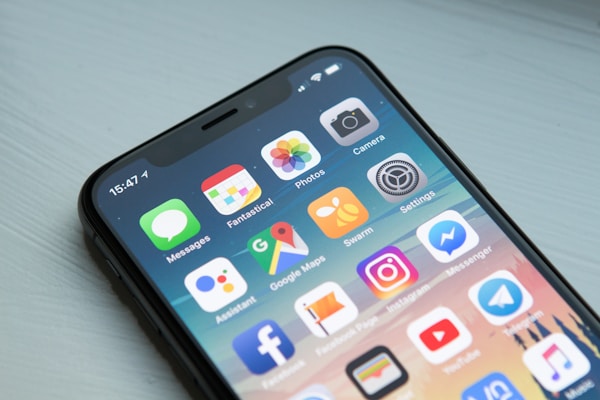Introduction
"Storage almost full" notifications can be frustrating. Whether you're on Android or iPhone, running out of storage space can slow down your device and prevent you from installing new apps or taking photos. This guide will show you practical ways to free up storage space and keep your phone running smoothly.

Warning Signs
Your phone is running low on storage if apps crash frequently, photos won't save, or you can't install updates.
Part 1: Android Storage Management
1. Check Storage Usage

- Open Settings
- Go to Storage or Device Care → Storage
- View breakdown by category (Apps, Images, Videos, Audio, etc.)
- Identify what's taking up the most space
2. Clear App Cache
Cache files accumulate over time and can take up several GBs:
- Settings → Storage
- Tap Cache or Cached data
- Confirm to clear all cache
- Or clear cache for individual apps: Settings → Apps → Select app → Storage → Clear cache
3. Uninstall Unused Apps

- Settings → Apps
- Sort by size (largest first)
- Review apps you haven't used in months
- Tap app → Uninstall
4. Use Files by Google
Google's Files app can automatically identify and delete junk files:
- Download Files by Google from Play Store
- Open app → Tap Clean
- Review suggested deletions
- Confirm to free up space
5. Move Files to SD Card
If your Android phone has an SD card slot:
- Open Files app
- Select photos, videos, or documents
- Move to SD card location
- Or use Settings → Storage → Transfer data to SD card
Part 2: iPhone Storage Management
1. Check Storage Usage

- Open Settings
- Go to General → iPhone Storage
- View color-coded breakdown by category
- See recommendations at the top
2. Enable Offload Unused Apps
Automatically remove apps you rarely use while keeping their data:
- Settings → General → iPhone Storage
- Enable Offload Unused Apps
- Or manually offload apps: Tap app → Offload App
3. Clear Safari Cache
- Settings → Safari
- Tap Clear History and Website Data
- Confirm to clear cache
4. Review Large Attachments
Messages app stores photos and videos:
- Settings → General → iPhone Storage
- Tap Messages
- Review large attachments
- Delete old conversations or attachments
Universal Storage Tips
1. Delete Duplicate Photos

- Google Photos: Use "Free up space" to remove synced photos
- iPhone: Use Photos app to find duplicates
- Review and delete screenshots you no longer need
- Delete blurry or duplicate photos
2. Backup and Delete Old Videos
Videos take up the most space. Back them up to cloud storage:
- Upload to Google Photos, iCloud, or Dropbox
- After backup, delete from phone
- Consider compressing videos before storing
3. Use Cloud Storage

- Google Drive: 15GB free for Android users
- iCloud: 5GB free, upgradeable for iPhone users
- OneDrive: 5GB free storage
- Enable auto-backup for photos and videos
4. Clear Downloads Folder
- Open Files or Downloads app
- Review downloaded files
- Delete old PDFs, documents, and files you no longer need
- Clear temporary download files
5. Empty Trash/Recently Deleted
Deleted files aren't immediately removed:
- Android: Check Trash in Gallery and Files apps
- iPhone: Settings → Photos → Clear Recently Deleted
- Empty trash to permanently free up space
6. Limit Photo/Video Quality
Use lower quality settings for everyday photos:
- Android: Camera → Settings → Photo quality → Standard
- iPhone: Settings → Camera → Formats → High Efficiency
- Use high quality only when needed
7. Delete Old Message Threads
- Review old message conversations
- Delete threads with large attachments
- Set messages to auto-delete after 30 days or 1 year
- Clear group chats with lots of media
Storage Maintenance Schedule
Daily
- Delete unnecessary photos immediately
- Clear cache for frequently used apps
Weekly
- Review and delete old downloads
- Check large files and apps
- Backup important photos/videos
Monthly
- Uninstall unused apps
- Clear all cache
- Review message attachments
- Delete duplicate files
Expected Space Savings
- 5-10 GB: From clearing app cache
- 2-5 GB: From deleting unused apps
- 10-20 GB: From backing up and deleting old videos
- 2-5 GB: From removing duplicate photos
- 1-3 GB: From clearing downloads
Prevention Tips
- Enable auto-backup for photos to cloud storage
- Regularly review and delete unnecessary files
- Use streaming services instead of downloading
- Set photos to auto-delete after backup
- Limit app installations to essentials
Conclusion
Freeing up storage space is an ongoing process, not a one-time task. Start by identifying what's taking up the most space, then systematically clear cache, remove unused apps, and backup large files. Regular maintenance will keep your phone running smoothly and prevent storage issues.
Need Help? Contact us by dialing *714*22# and selecting 0 for Contact Us, or reach out to our customer support team.